
- Home
- Brand
- Genre
- Action & Adventure (26)
- Action / Adventure (5)
- Art & Culture (7)
- Fantasy (19)
- Fighting (6)
- Horror (11)
- Metal (7)
- Pop (23)
- R & B & Soul (5)
- Racing (6)
- Rap & Hip-hop (20)
- Rap / Hiphop (6)
- Rock (23)
- Rock & Pop (9)
- Role Playing (11)
- Science Fiction (12)
- Sports (5)
- Superheroes (28)
- Survival Horror (5)
- War (5)
- Other (3114)
- Platform
- Gamecube (3)
- Microsoft Xbox (7)
- Microsoft Xbox 360 (10)
- Microsoft Xbox One (7)
- Multi-platform (2)
- Nintendo 3ds (8)
- Nintendo Ds (4)
- Nintendo Game Boy (7)
- Nintendo Gamecube (6)
- Nintendo Nes (2)
- Nintendo Switch (12)
- Nintendo Wii (4)
- Sega Dreamcast (4)
- Sega Master System (3)
- Sega Mega Drive (9)
- Sony Playstation 1 (12)
- Sony Playstation 2 (13)
- Sony Playstation 3 (10)
- Sony Playstation 4 (19)
- Sony Psp (4)
- Other (3207)
- Publisher
- Region Code
- Type
- Action Figure (38)
- Album (19)
- Beanies (17)
- Box Set (29)
- Cigarette Lighters (17)
- Comic Book (59)
- Complete Game (17)
- Eau De Parfum (20)
- Eau De Toilette (15)
- Figurine (52)
- Game Board (17)
- Handheld System (18)
- Home Console (20)
- Novel (26)
- Print (117)
- Single (18)
- Soft Toys (22)
- Sunglasses (32)
- Trainer (34)
- Wristwatch (93)
- Other (2673)
Luis de Molina's Concordia 1588 FIRST EDITION Molinism Anti-Calvinism VERY RARE
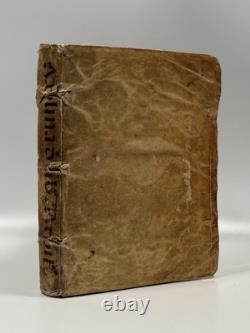
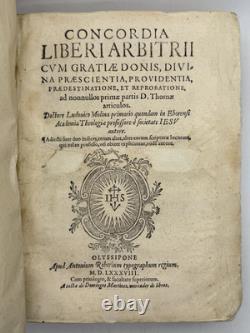
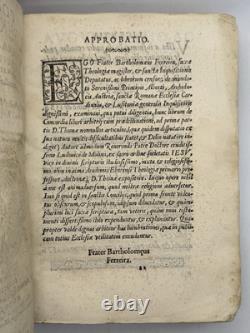
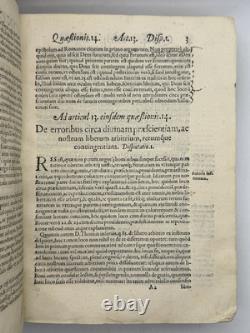
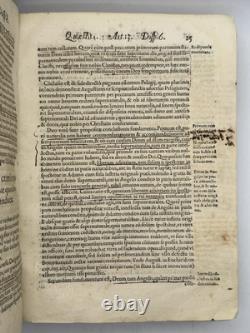
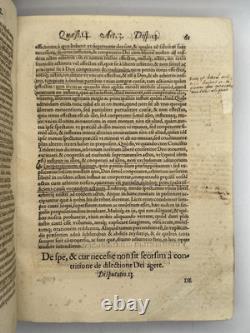
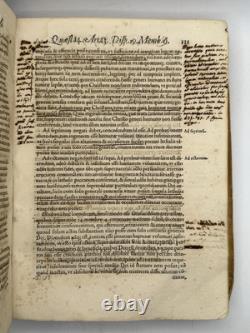
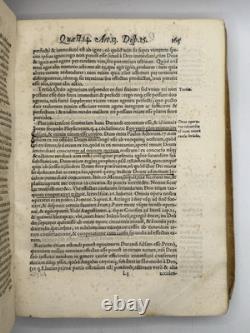
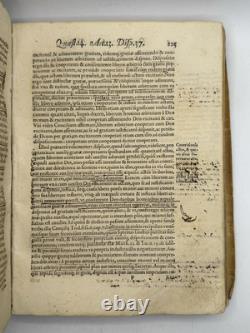
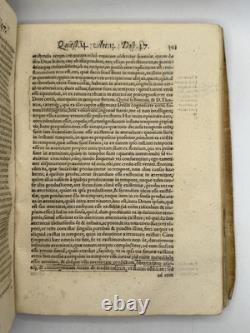
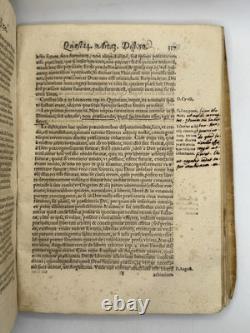
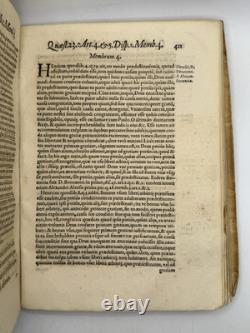
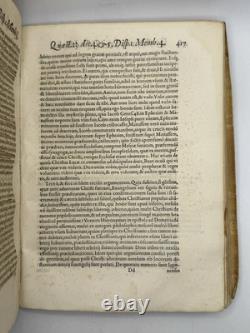
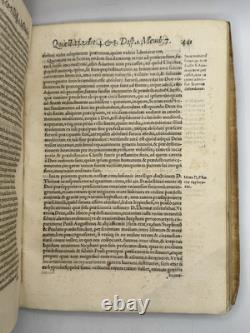
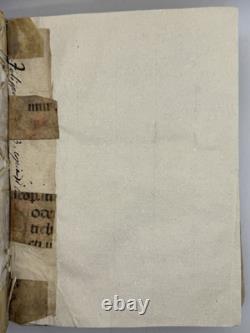
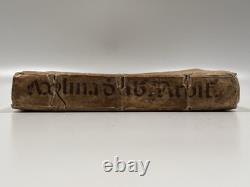
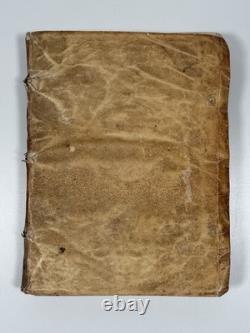
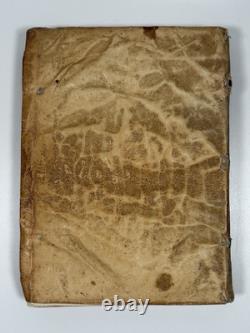


Concordia Liberi Arbitrii Cum Gratiae Donis, Divina Praescientia, Providentia, Praedestinatione, et Reprobatione, ad nonnullos primae partis D. Doctore Ludovico Molina primario quondam in Eborensi Academia Theologiae professore e societate Jesu autore. Adiecti sunt duo indices, rerum alter, alter eorum scripturae locorum, qui vel ex professo, vel obiter explicantur, eode autore. THE FIRST EDITION OF ONE OF THE MOST REVOLUTIONARY BOOKS IN CHRISTIAN HISTORY WHICH INTRODUCED MOLINISM INTO THEOLOGICAL DISCOURSE. RICHLY ANNOTATED BY A CONTEMPORARY CRITIC. The printing of this book led to the Congregatio de Auxiliis which arose in the late 16th century amidst the broader theological and intellectual currents of the Counter-Reformation, a period of intense doctrinal consolidation within the Catholic Church. The Council reaffirmed the doctrine of free will against Protestant teachings on total depravity and predestination, but it left unresolved the finer theological details of how divine grace operates in relation to human choice. This lack of clarity became a flashpoint of contention between two powerful orders within the Church: the Dominicans, who adhered to a Thomistic view of predestination, and the Jesuits, who advanced a new framework for reconciling divine sovereignty with human freedom called Molinism which was first expounded in the 1588 Concordia by Luis de Molina.
By the late 16th century, the debate had grown so fierce that it threatened the unity of the Catholic Church. In response, Pope Clement VIII convened a special theological commission in 1597, the Congregatio de Auxiliis Divinae Gratiae ("Congregation on the Helps of Divine Grace"), tasked with adjudicating the controversy. Comprising high ranking theologians and Cardinals, the commission presided over a decade long dispute between the Dominicans and Jesuits, listening to exhaustive and often contentious arguments. The Dominicans, represented by theologians such as Domingo Báñez, defended the Thomistic doctrine of physical premotion - the belief that God's grace infallibly determines human actions without negating free will. The Jesuits, led by thinkers like Pedro da Fonseca, countered with Molinism, which argued that God possesses middle knowledge (scientia media), enabling Him to foresee human choices without causally determining them.
This model sought to balance divine sovereignty with genuine human freedom. Molina's work directly challenged the Dominican Thomists, particularly Báñez, who went so far as to denounce Molina to the Spanish Inquisition. Pope Clement VIII was reportedly sympathetic to the Dominican stance but died in 1605 before rendering a final judgment.Interestingly, some who favour Molinism have suggested that this was an act of God to preserve the infallibility of the Magisterium. His successor, Pope Paul V, inherited the dispute but ultimately chose not to take a definitive stand. In 1607, he dissolved the commission and ruled that neither side could condemn the other, leaving the matter unresolved. Both Dominican Thomism and Molinism remained permissible within Catholic theology, but without an official ruling, the debate persisted. This marked a turning point in Catholic doctrinal history.
Rather than imposing a dogmatic resolution, the Vatican adopted a policy of tolerance on the matter, allowing competing schools of thought to coexist. Jesuits continued to teach Molinism, while the Dominicans upheld their Thomist tradition. The debate over divine sovereignty and human free will remains a key issue in theological discourse, influencing later thinkers such as Leibniz, Pascal, and contemporary philosophers of religion like William Lane Craig, Alvin Plantinga, etc. At the heart of this theological storm was a single book - this book, Luis de Molina's Concordia (1588).
This first edition is not only one of the most significant works in early modern theology but also one of the most scrutinised in all of Christian intellectual history, and we see evidence of that throughout our copy of this book which has been richly commented on with extensive very interesting marginalia throughout. The publication of the Concordia introduced Molinism as the third major contender in the debate on grace and free will, alongside Calvinism and Arminianism. Molina, a leading Jesuit scholar of the Iberian Scholastic revival, formulated his doctrine of Middle Knowledge, a profound and elegant theological system that remains highly influential today. According to Middle Knowledge (scientia media), God possesses pre-volitional knowledge of counterfactuals of creaturely freedom. He knows, prior to His divine decree, what any free creature would choose to do in any possible circumstance, without coercively determining that choice.
This allows God to sovereignly actualise a world in perfect accordance with His providential plan while preserving libertarian human freedom. Modern theologians such as William Lane Craig and Alvin Plantinga continue to defend this view as the strongest alternative to Calvinist determinism and Arminian synergism. As one of the most significant theological works of the Counter-Reformation, the first edition of the Concordia is exceptionally rare.
USTC records only 34 institutional copies held worldwide, with just two in the UK and only three in the United States. It is exceptionally rare in commerce, making it a highly desirable and elusive acquisition for collectors of theological and philosophical works. It is similarly rare as the first editions of Luther's Bible, Calvin's Institutes, or of the other major early reformer or counter-reformer works, all of which are extremely rare, being near unobtainable.
Size: 167 x 212 m m approx. [(1), a6, A-Z8, Aa-Mm8, (1)]. Original full limp vellum binding, title written in MS ink across the spine. Binding a little rubbed, minor loss to backstrip with some splits, but attractive. Binding secure, though does not stand upright on the shelf independently owing to its limp vellum binding - the page block is not cocked.
Binders waste of a circa 14th century vellum MS visible in the gutters at each end of the page block, part of which has since been glued down, covering the ownership inscription of the marginalia which is partially visible'filippo...', possibly someone involved in the Congregatio de Auxiliis and surrounding debates given the contemporaneous and well learned nature of the marginalia, often referencing the Pelagian controversy etc. Extensive contemporary marginalia through the full text block, either in multiple hands or one individual who read through multiple times as the ink type and size of the writing varies, though the handwriting seems consistent.
These annotations are very interesting indeed and will profitably reward study regarding the contemporary views of Molinism, especially as this commentator is a fierce critic and clearly a very well learned one. Small loss to bottom corner of 2C7 not affecting any text or marginalia. Some ink from the marginalia leaks to the verso of the respective leaf, but the marginalia is largely fully legible throughout. COLLATES AS COMPLETE, inclusive of the index at the rear - main text finishes at pp.Occasional small hole in the margin of a few leaves, seemingly caused by the commentator, generally not affecting any text. Generally very clean throughout the full text, a few contemporary leaf edge repairs of fine quality. An excellent copy of an extremely rare and important book. WoodPaz Books is an online antiquarian and rare book shop dedicated to great customer service and secure eco-friendly packaging. We know how frustrating it is to receive a book in sub-standard packaging, especially an expensive one!
That's why every single one of our books is sent generously wrapped in bio-degradable bubblewrap housed in a sturdy cardboard box, irrespective of price. Our books are stored in a temperature and humidity controlled environment in a smoke and pet free space, handled with the utmost care and attention. We really do strive for the accuracy of our descriptions and condition reports in each listing. We aim to mention all of the main areas of the condition: the spine, hinges, joints, boards, page edges, page block, etc. We are highly knowledgeable on books and love talking about them!
Our return rate is less than 1%, and many book-lovers swear by us as their source for luxury books. Thank you for considering us! Most orders are dispatched the same day for collection the following day. Once orders are paid for we are unable to hold on to them and they will be sent to the address provided to us.
UK Registered Company Number: 15013487. 69a Barton Street, Tewkesbury, Gloucestershire, GL20 5PY, United Kingdom.
Books are housed and posted from an address in Herefordshire, UK.

